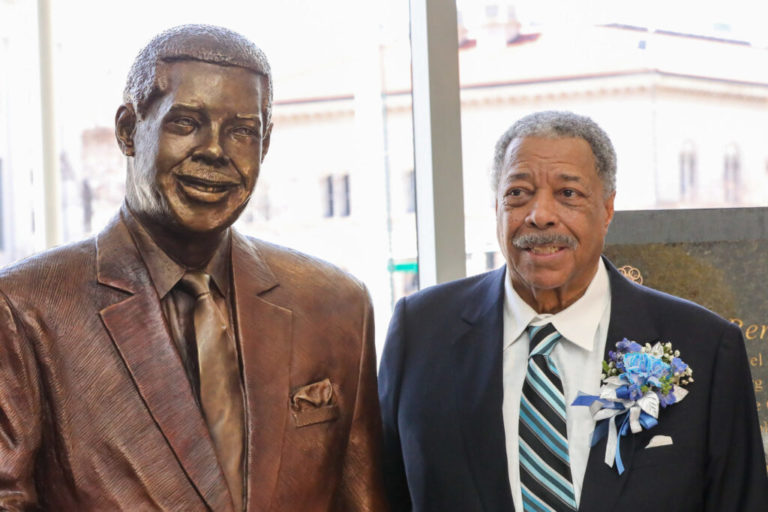By: Ernest Gurulé
If there is one thing to know about former Denver Mayor Wellington Webb, it’s that the man you see is the man he is. There is no pretense. The handshake, firm; the smile, genuine; his word, bankable. His memory? Don’t bet against it.
It has been nearly two decades since Webb left office as Denver’s chief executive. From 1991 to 2003, Webb called some of the city’s and region’s biggest shots. His climb soared exponentially, going from a
guy nearly swimming underwater—a skinny seven percent in name recognition— in the polls in his first run for mayor to becoming nearly synonymous with the growth and dynamism that marked Denver dur-
ing his stay at City Hall.
Physically, the former mayor can seem almost imposing, standing six-foot four and weighing well over two hundred pounds. But he’s comfortable in his skin and confident in his manner, traits stealthily, sometimes sternly massaged into his character by his late grandmother, Helen Gamble, the woman who raised him and a tempest in her own right.
As he sat and listened to the many accolades and documented accomplishments from his three terms in office at last week’s public dedication of a statue cast in his image and that now stands outside the building bearing his name, he might have thought about her a time or two. After all, during the long ago fifties, it was Miss Gamble who regularly fine-tuned his radar on the challenges a young Black man in America would experience as well as how best to navigate both the thoughtless and unconscious ignorance too often common in those times.
During a recent phone interview, her memory came up early and often in an extended conversation. “If there is one thing my grandmother taught us,” he said, “it was, ‘carry yourself with dignity, don’t run and don’t postpone.’”
Webb’s recollection of common fifties-era slights Black Americans experienced still resonates with him almost as clearly as when they happened more than a half century before. A long ago young boy’s adventures became life lessons.
For winning a high school oratory contest, his grandmother rewarded him with a trip to the South to visit relatives. The trip coincided with one of the era’s ugliest and most searing moments. Emmett Till, a young Black boy, had recently been abducted and brutally murdered by three White men in Mississippi for allegedly flirting with a White woman. It was the same state where Webb and his grandmother were headed.
“When the train got to Amarillo,” he recalled, “we had to move to the back of the train.” His grandmother soothed him with the words spoken regularly to young Black children during the era. “That’s the way it works,” she told a young Wellington. “You’ll have to let it go.” But for a young boy, a life lesson like that is not easily let go.
Years later, after a stint in ‘community organizing,’ after winning his first elective office—the state legislature—, after a presidential appointment followed by a state cabinet appointment, after serving as city auditor and now as Mayor, an incident at Denver’s George Washington High School brought things full circle.
He had gone there to speak but one particular moment took him back to that long ago train ride along with other moments in his adolescence and the real time experience of deep-rooted southern normalcy and the words, ‘We don’t serve your kind’ or ‘you’ll have to get your food to go.’ It suddenly all came rushing back.
“At a meeting at George Washington High School,” he recalled school officials telling his security team, “’We’ve got a special entrance for the Mayor.’” The thinking being, entering discreetly was a safer idea. The ‘special entrance’ was a back door. The words echoed like a clanging school bell. “Tell them,” Webb recalled, “the Mayor doesn’t go in back doors!” He was rerouted to the main entrance.
Being cast in an underdog role has been part of the deal for Webb from his earliest days in the legislature. It’s also the place where he learned and came to appreciate perspective.
One day, he said, he looked across the aisle and wondered, “How in the hell could they get elected!” Then, just as quickly, he chuckled, “they’re probably asking the same question about me.” The lesson served the then goateed, dashiki-wearing young man with the Afro hairdo well, especially when “taking on causes no one else would touch.”
The list, he said, included bills helping Colorado’s LGBQT community. “Webb Introduces Homosexual Bill,” were headlines he remembered in Denver papers. Black pastors were “some of the people who came after me.” He also introduced legislation helping adoptees in getting birth records and measures making it easier for ex-convicts to get jobs. “I was trying to make a difference in lives of people when the system did not
work for them.”
Listing his accomplishments as Mayor can wait for a sometime in a future book, though one, “The Man, the Mayor and the Making of a Modern City,” already chronicles many. In his La Voz Bilingue interview, Webb cited completion of DIA as perhaps his biggest accomplishment. When he took office, the project was beset with setbacks, including a cursed and unpredictable baggage system.
He also lists returning what used to be Denver General Hospital from life support to solvency. But surprisingly, he’s also proud of his open space contributions to Denver. “I’ve always been a ‘parks guy’…I’ll fight you over a blade of grass,’” he regularly says. In fact, no previous Denver mayor, including the late Tom Currigan, a man whose name is associated with open space, has added as much green to the city.
But in a city known to call him simply ‘Wellington,’ the name is rarely spoken without including another. His wife of 53 years, Wilma, not only has been witness to his rise, but a major reason for it. “We complement each other,” he said, before adding with a laugh, “sometimes good, sometimes not so good.”
Wilma Webb has her own legislative accomplishments and is credited with the inspiration behind Denver’s annual Martin Luther King, Jr., ‘marade,’ held each January. She was also a driving legislative force in making MLK’s birthday a state holiday. In many ways, Webb said, without Wilma there might not be a Wellington.
In another time when both were young, Webb recalled the two of them sitting at Red Rocks and scanning the city. “One day,” he told her, “I’m gonna be mayor of Denver and she didn’t question,” he said. Her reply? “I know you will.”
Coming from Chicago to Denver for his asthma worked out well for a young Wellington Webb. Having two strong women as part of the journey, Helen Gamble, as a grandmother, and a life partner like Wilma Webb also proved beyond simple good fortune.
“I think I exceeded expectations,” the Mayor said modestly. “I tried to make a difference in people’s lives,” he said. Doing that, he added, is what everyone should do. “Help others. I think I’ve done that.”


















Charter schools and Latino education
By: David Conde
In my senior year of college, the voices of Latino discontent with injustice in America reached a watershed moment. The community was awakening to its status as a forgotten and ignored minority.
That year also saw the publication of a collection of essays entitled La Raza: Forgotten Americans (1966), edited by Julian Samora of Notre Dame University and The Invisible Minority (1966), a National Education Association report reflecting the dysfunctional condition of Latino education. These were later followed by 6 Office of Civil Rights reports that documented lower teacher expectations for Latino students than for other children.
The historical moment that began to open the eyes of the country to the educational plight of young Chicanos combined with my personal experience as a second class citizen, led to a search for improvement that produced a commitment and dedication to change. That way of thinking continues as way face the challenge of a K-12 system that is not working for everyone.
Graduate school for me was also a laboratory of experimentation with new approaches to the study of the human experience found in literature and in my own life. Thus, I became a critic that analyzed the journey in literature and more importantly, in my own search for identity and place as an American.
The result is that my career in higher education and beyond has also coincided with a constant search for ways for our community and our country to better serve our children and the future they represent. That has included school physical innovations like open classrooms, methodologies like modular instruction, the use of strategic planning platforms like those in competency-base and performance-based education and language and cultural objective found in bilingual and dual language instruction.
It is well documented that the great push for the development of excellence in K-12 schooling and beyond has run its course. Former Denver Mayor Federico Pena who imagined a great city and made it so, in an April 12, 2022 commentary in the Denver Post said as much as he points out that “the Denver Board of Education has no plans to recover learning for our students, who are struggling with the most fundamental components of education.”
America’s K-12 system is in trouble to the point that alternatives such as charter schools have increasingly
become a better option for children and their families. “The success of charter schools boils down to the notion that they obey the intent of a group of parents and community leaders who come together to make decisions about the future of their children and about how that future should be best
approached.”
This perspective has been the secret to the long success of Head Start programs throughout the country. Although favoring a variety of academic interests and specialties, charter school systems look to express the same intent in their governance.
Latinos committed to helping to create educational opportunities for their children are particularly interested in systems like charter schools designed to address specific needs. Latino immigrant parents are specifically devoted to the charter school movement because of the unique needs on the part of their children for a dual language environment especially in the early years.
Also, high school students from immigrant families favor the flexibility charter schools offer in day and night scheduling because they tend to also work to support their families. Their success despite these obstacles represents another step in the building of a new America.
Latinos have come a long way from 1966. Yet, the journey continues.